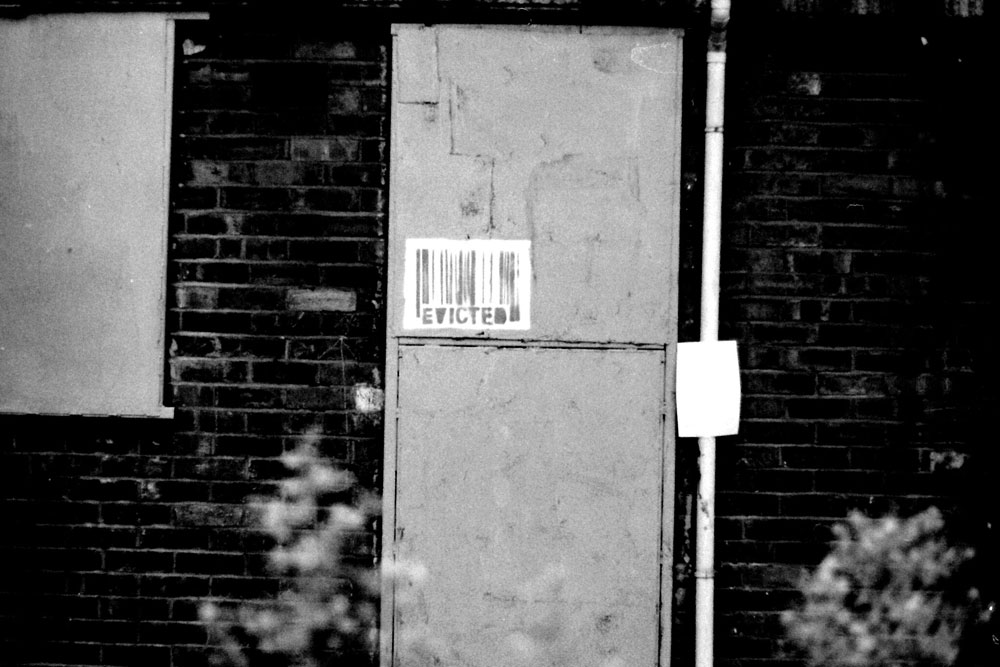
July 8, 2020; Vox and Washington Post
“The United States is facing an eviction crisis of biblical proportions,” says Aaron Carr, founder and executive director of the Housing Rights Initiative, in an interview with Vox reporter Jen Kirby.
Statistics bear him out. The COVID-19 Eviction Defense Project reports that of 110 million US residents living in rental households, 20 percent, or about 22 million, are at risk of eviction by September 30th. We could see an increase in homelessness of 40 to 45 percent, increasing the already astronomical numbers of houseless individuals from over a half-million to 800,000.
Those most affected by the eviction crisis are those already most impacted by COVID-19. In an Urban Institute analysis of data collected by the US Census Bureau, 44 percent of Latinx and 41 percent of Black renters reported little confidence in their ability to pay their July rent. Twenty-one percent of white renters had the same response. That response was confirmed in actual experience: according to CNBC, 32 percent of US households missed their July housing payments.
So far, the eviction crisis has been staved off by eviction moratoriums and supplemental unemployment benefits provided by the CARES Act, the relief legislation passed by Congress in April. But this patchwork of federal and state assistance is coming to an end, just as the coronavirus is spreading out of control across much of the country. If Congress does not act, the weekly $600 in supplemental unemployment benefits will end by July 31st, and the federal eviction moratorium, which applies to landlords with Freddie Mac and Fannie Mae-backed mortgages, will end August 31st.
State and local eviction moratoriums are already being lifted, and the results are telling. Milwaukee, which lifted its moratorium in late May, has seen a 13 percent increase in evictions over previous years. Nearly 1,300 evictions were filed in June—two-thirds in Black neighborhoods. In the Houston area, where hospitals have hit maximum capacity with coronavirus patients, 2,000 eviction notices were filed in June.
In response to the uptick in eviction notices, Diane Yentel, president and chief executive of the National Low-Income Housing Coalition, told the Washington Post, “That wave [of evictions] has already begun. We are trying to prevent it from becoming a tsunami.”
The housing affordability crisis is not new. Long before the COVID-19 pandemic, the US faced an affordable housing emergency. In a recent NPQ roundtable, housing activists Andreanecia Morris (HousingNOLA), Amina Kirk (Detroit People’s Platform), and Miriam Axel-Lute (Shelterforce) discussed the failures of housing policy in the US, and the disproportionate impact that eviction crisis will have on people of color.
The Joint Center for Housing Studies of Harvard University estimates that of 43 million renter households, nearly half—20.8 million—were “cost burdened” before the pandemic, paying over 30 percent of their income for housing. Over 10 million households spent over half their income on housing. Many of these households were one paycheck away from a financial crisis. Now they face mass unemployment, and these already too-high rents are unsustainable.
“There is a deep structural bias against affordable housing,” said Morris. “Elected officials have shown no commitment to this issue.” Kirk echoed these sentiments, saying “This is a funding issue; there is a lack of political will.”
Sign up for our free newsletters
Subscribe to NPQ's newsletters to have our top stories delivered directly to your inbox.
By signing up, you agree to our privacy policy and terms of use, and to receive messages from NPQ and our partners.
In both of their cities—Detroit and New Orleans—luxury housing is prioritized over affordable units. Despite having a preponderance of renters, Kirk explained, Detroit housing policy is focused on homeowners. In New Orleans, said Morris, over 7,000 housing units are available, but 1,000 residents with housing vouchers cannot find a place to live. These displaced residents suffer from the burden of unsafe, vermin-invested, poorly maintained and overcrowded housing. Not surprisingly, the lack of safe, affordable housing left millions of people in conditions that made them vulnerable to the coronavirus, and now puts them at even more risk for housing instability.
The root of these problems, argued Axel-Lute, is the commodification of housing. “By mixing speculation with housing security,” she argued, “racial injustice is reinforced.” White neighborhoods fear a “loss in property value,” which many equate with retirement security. These communities then fight affordable housing, which would allow low-income families, including families of color, to move into the neighborhood. “Even progressives have failed on this issue,” said Axel-Lute.
Housing activists are using multiple strategies to address the immediate eviction crisis. Tenant associations have organized rent strikes and eviction blockades and mutual aid associations are helping families with direct donations toward rent payments. But to address the massive scale of the problem, said Axel-Lute, there are two options: rent cancellation or rent relief.
Rent relief would target funds to those who need help. The HEROES Act, passed by the House of Representatives in May but stalled in the Senate, includes $100 billion for emergency rental assistance and $200 billion for housing and homelessness programs. The House also passed a standalone rent relief bill in June, which sets aside $100 billion in emergency rental assistance and $75 billion relief fund for homeowners. It would also extend the eviction moratorium until March 2021.
Rent relief at this level could, according to the Urban Institute, maintain housing stability for 20 months. The downside is that rent relief would not likely cover undocumented families or those working in the informal economy. Families would have to prove they had been impacted by COVID-19, which can be difficult for non-English speakers and workers who are paid in cash. Paperwork may also be complicated, and remote filings and hearings require internet access that is not available to all.
Rent cancellation would be more comprehensive, covering all families for the duration of the crisis. But it would have a more severe impact on landlords, who need rent to pay mortgages, keep up with maintenance, pay property tax, and so on. Mortgage forbearance—with payments tacked on to the end of the mortgage contract—could help small landlords survive, but the process of rewriting mortgages, noted Axel-Lute, is complicated. A negative outcome from rent cancellation could be a fire sale on smaller buildings in which private equity sweeps up real estate and turns it into luxury housing.
These are the questions that policymakers must grapple with if we are to effectively address the immediate eviction crisis and ensure that both renters and small landlords are made whole. But we also need to make a commitment to housing policies that put the right to shelter above the needs of financial markets.
This will take a real commitment to funding affordable housing, said the panelists at the NPQ roundtable, as well as a more level playing field, in which it is more expensive for landlords to file eviction complaints, and tenants have access to legal representation.
Long-term solutions include land trusts and cooperative housing, democratically controlled property that offers long-term affordability because it is removed from market speculation. To fund these long-term solutions, however, the nonprofit sector needs to come together to reframe housing as a human right and to hold our political leaders accountable for ensuring every person in the US has access to safe and affordable shelter.—Karen Kahn











